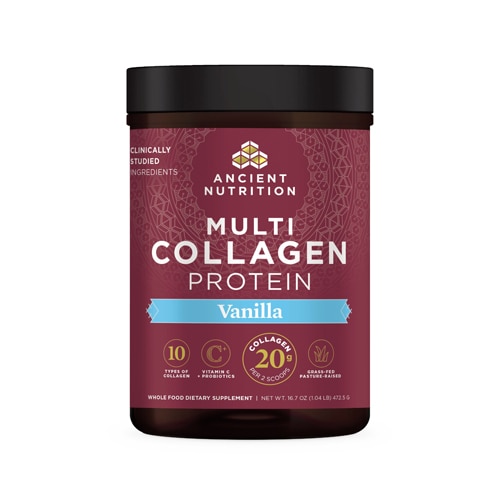A healthy diet and
supplements can be beneficial at any age, but for aging adults, they can play an especially important role in helping to maintain overall health and functionality.
All adults require certain vitamins, minerals, fatty acids and
antioxidants in their diets to maintain normal levels of essential nutrients. If one or more nutrients is lacking, which is common among people who eat a “standard Western diet,” then the aging process may feel more difficult, with signs of aging being noticeable earlier on.
Which nutrients and supplements are most important for promoting healthy aging? Let’s look below at some of the most essential ones to add to your diet and wellness routine.

7 Best Anti Aging Supplements
Including the best supplements described below in your daily routine can help take care of your entire body — including your gut, joints, skin, muscles, bones, brain and heart. Here are the top supplements for healthy aging, along with their key benefits and uses.
1. Collagen protein
Collagen is a type of structural protein that’s found throughout the body, particularly in connective tissues. It’s the most abundant protein in our bodies, as it helps to form muscles, bones, skin, blood vessels, tendons and the lining of the gut and organs.
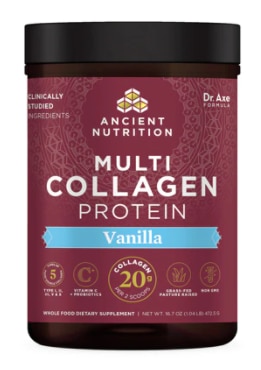
As we age, collagen production begins to naturally slow down, which can increase normal signs of aging. Using a collagen powder supplement each day is a convenient and effective way to help give the body the building blocks is needs, in the form of amino acids, to continue to make its own collagen.
Collagen supplements are used to generally support joint function, gut health and healthy skin, hair and nails. Benefits of adding more collagen to your diet can include promoting gut lining integrity, skin elasticity and joint comfort and mobility.
†
Because it aids in keeping joint and ligaments healthy, this type of protein also supports exercise performance and recovery, can help reduce discomfort post-exercise, and helps support a normal range-of-motion.
†
Collagen powder is usually unflavored and can be mixed into coffee,
smoothies, oatmeal, baked goods, soups and many other recipes. Aim to consume between 1–3 servings daily, or about 10 to 30 grams of collagen protein per day in total.
2. Good-quality multivitamin
Taking a high-quality multivitamin every day is a smart way to meet your nutritional needs and to fill in potential gaps in your diet, such as low levels of vitamin D, magnesium or B12 levels, which are very common.
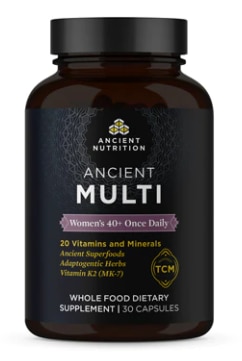
Look for formulas featuring 100% or more of the daily value of 14 essential vitamins and minerals that your body needs, including vitamins A, C, D, E, K, B vitamins, calcium, iron, zinc and others.
Ensuring you meet your nutritional needs will support a healthy immune response and healthy digestion, while also supporting strong bones, healthy skin, cognitive and cardiovascular health, and a normal metabolism.
†
To help with absorption, opt for a multivitamin that is food-based, and perhaps one that contains activated and fermented ingredients which support your ability to utilize the nutrients. Take multis with a meal to reduce the potential for an upset stomach.
3. Omega-3 fatty acids
Omega-3 fatty acids are needed to promote cardiovascular health, brain function and a healthy inflammatory response. These fats are “essential” because we need to get them from our diets, as our bodies cannot make them on their own.
You can obtain omega-3s from oily fish like salmon and
sardines, but most people don’t eat these foods very regularly, which is why supplements are often recommended.
It’s common for people eating a “modern diet” to eat lots of processed foods that are made with refined vegetable oils that lack omega-3s, which means most (up to 90 percent of Americans) are falling short of their omega-3 needs.
Taking a daily
omega-3 supplement makes it easy to get a balanced serving of different essential fatty acids, including omegas 3s, 6s and 9s. As you age, higher intake of omega-3s can support joint health, smooth, healthy skin and a healthy response to oxidative stress.
†
Most adults can benefit from about 1,000 milligrams of omega-3 fatty acids daily, which can be taken in capsule or liquid form.
4. Vitamin D
Although vitamin D is likely to be found in your multivitamin, in some cases, adding even more to your routine can go a long way.
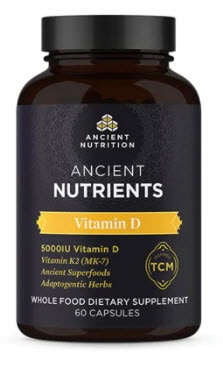
Nicknamed the “sunshine vitamin,” our skin is able to synthesize vitamin D when exposed directly to sunlight. The problem is that most adults don’t spend much time in the sun these days, leading to low vitamin D levels.
Taking a
vitamin D supplement is recommended for most adults to help meet their daily needs. Maintaining normal levels is important for strengthening bones and boosting calcium absorption, as well as supporting healthy immune function, a positive outlook and healthy weight management.
While your best bet is to make sure you get enough sunlight each day, such as spending about 15–20 minutes outside most days of the week without sunscreen on, you can also take a vitamin D3 capsule daily. Vitamin D3 is the type that’s thought to be generally more effective at increasing vitamin D levels.
†
The recommended dietary allowance (RDA) for vitamin D varies based on age. Adults under 70 years need at least 600 IUs per day. Some experts recommend even more, up to 5,000 IU daily.
5. Turmeric
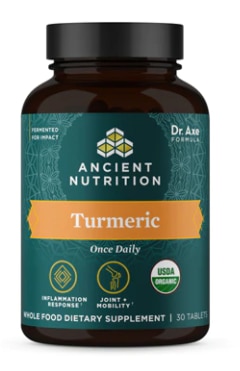 Turmeric
Turmeric is an herb that has been used in ancient health approaches for centuries, including to promote a healthy inflammation response. It also helps with joint support by decreasing discomfort and assisting in mobility and range of motion.
†
Turmeric's most active compound is called curcmin, which offers benefits such as reducing joint discomfort, improving mobility and comfort, supporting healthy energy levels and supporting a healthy intestinal and respiratory mucosal immune response.
†
There isn’t a standard dosage of turmeric that’s recommended, so always read directions for the product you’re taking. Ideally take a turmeric supplement that contains black pepper, which helps with absorption.
6. Vitamin B12
For adults lacking energy, or those who eat a plant-based diet (vegetarians or vegans),
supplementing with extra vitamin B12 can be beneficial for mood and metabolic support.
†
B12 is important for supporting healthy energy levels, maintaining healthy red blood cells, and supporting cognitive and neurological health.
†
The daily recommended intake of B12 is 2.4 mcg per day for adults. B12 can be taken with or without food.
7. Calcium
Calcium helps to keep bones and teeth strong by contributing to their density, supports muscle functions, and assists in heart and arterial health. Calcium works closely with vitamin D to maintain skeletal health, so you want to be sure to get enough of both.
†
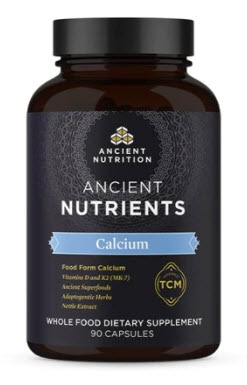
Low levels of calcium can contribute to bone fractures in older adults, especially among post-menopausal women who are most at risk for bone loss.
It’s recommended that you get calcium first and foremost from food sources, such as dairy products include milk and yogurt, almonds, dark-green leafy vegetables and cruciferous veggies like broccoli.
Supplementation is not recommended for all adults, since too much calcium can be problematic. Some calcium is found in most multivitamins, but discuss taking a
calcium supplement with your doctor before beginning to supplement if you suspect you could use more.
Typically, about 1,000 milligrams per day for is recommended for adults.
†These statements have not been approved by the Food and Drug Administration. These products are not intended to diagnose, treat, cure or prevent disease.
 As we age, collagen production begins to naturally slow down, which can increase normal signs of aging. Using a collagen powder supplement each day is a convenient and effective way to help give the body the building blocks is needs, in the form of amino acids, to continue to make its own collagen.
Collagen supplements are used to generally support joint function, gut health and healthy skin, hair and nails. Benefits of adding more collagen to your diet can include promoting gut lining integrity, skin elasticity and joint comfort and mobility.†
Because it aids in keeping joint and ligaments healthy, this type of protein also supports exercise performance and recovery, can help reduce discomfort post-exercise, and helps support a normal range-of-motion.†
Collagen powder is usually unflavored and can be mixed into coffee, smoothies, oatmeal, baked goods, soups and many other recipes. Aim to consume between 1–3 servings daily, or about 10 to 30 grams of collagen protein per day in total.
As we age, collagen production begins to naturally slow down, which can increase normal signs of aging. Using a collagen powder supplement each day is a convenient and effective way to help give the body the building blocks is needs, in the form of amino acids, to continue to make its own collagen.
Collagen supplements are used to generally support joint function, gut health and healthy skin, hair and nails. Benefits of adding more collagen to your diet can include promoting gut lining integrity, skin elasticity and joint comfort and mobility.†
Because it aids in keeping joint and ligaments healthy, this type of protein also supports exercise performance and recovery, can help reduce discomfort post-exercise, and helps support a normal range-of-motion.†
Collagen powder is usually unflavored and can be mixed into coffee, smoothies, oatmeal, baked goods, soups and many other recipes. Aim to consume between 1–3 servings daily, or about 10 to 30 grams of collagen protein per day in total.
 Look for formulas featuring 100% or more of the daily value of 14 essential vitamins and minerals that your body needs, including vitamins A, C, D, E, K, B vitamins, calcium, iron, zinc and others.
Ensuring you meet your nutritional needs will support a healthy immune response and healthy digestion, while also supporting strong bones, healthy skin, cognitive and cardiovascular health, and a normal metabolism.†
To help with absorption, opt for a multivitamin that is food-based, and perhaps one that contains activated and fermented ingredients which support your ability to utilize the nutrients. Take multis with a meal to reduce the potential for an upset stomach.
Look for formulas featuring 100% or more of the daily value of 14 essential vitamins and minerals that your body needs, including vitamins A, C, D, E, K, B vitamins, calcium, iron, zinc and others.
Ensuring you meet your nutritional needs will support a healthy immune response and healthy digestion, while also supporting strong bones, healthy skin, cognitive and cardiovascular health, and a normal metabolism.†
To help with absorption, opt for a multivitamin that is food-based, and perhaps one that contains activated and fermented ingredients which support your ability to utilize the nutrients. Take multis with a meal to reduce the potential for an upset stomach.
 Nicknamed the “sunshine vitamin,” our skin is able to synthesize vitamin D when exposed directly to sunlight. The problem is that most adults don’t spend much time in the sun these days, leading to low vitamin D levels.
Taking a vitamin D supplement is recommended for most adults to help meet their daily needs. Maintaining normal levels is important for strengthening bones and boosting calcium absorption, as well as supporting healthy immune function, a positive outlook and healthy weight management.
While your best bet is to make sure you get enough sunlight each day, such as spending about 15–20 minutes outside most days of the week without sunscreen on, you can also take a vitamin D3 capsule daily. Vitamin D3 is the type that’s thought to be generally more effective at increasing vitamin D levels.†
The recommended dietary allowance (RDA) for vitamin D varies based on age. Adults under 70 years need at least 600 IUs per day. Some experts recommend even more, up to 5,000 IU daily.
Nicknamed the “sunshine vitamin,” our skin is able to synthesize vitamin D when exposed directly to sunlight. The problem is that most adults don’t spend much time in the sun these days, leading to low vitamin D levels.
Taking a vitamin D supplement is recommended for most adults to help meet their daily needs. Maintaining normal levels is important for strengthening bones and boosting calcium absorption, as well as supporting healthy immune function, a positive outlook and healthy weight management.
While your best bet is to make sure you get enough sunlight each day, such as spending about 15–20 minutes outside most days of the week without sunscreen on, you can also take a vitamin D3 capsule daily. Vitamin D3 is the type that’s thought to be generally more effective at increasing vitamin D levels.†
The recommended dietary allowance (RDA) for vitamin D varies based on age. Adults under 70 years need at least 600 IUs per day. Some experts recommend even more, up to 5,000 IU daily.
 Turmeric is an herb that has been used in ancient health approaches for centuries, including to promote a healthy inflammation response. It also helps with joint support by decreasing discomfort and assisting in mobility and range of motion.†
Turmeric's most active compound is called curcmin, which offers benefits such as reducing joint discomfort, improving mobility and comfort, supporting healthy energy levels and supporting a healthy intestinal and respiratory mucosal immune response.†
There isn’t a standard dosage of turmeric that’s recommended, so always read directions for the product you’re taking. Ideally take a turmeric supplement that contains black pepper, which helps with absorption.
Turmeric is an herb that has been used in ancient health approaches for centuries, including to promote a healthy inflammation response. It also helps with joint support by decreasing discomfort and assisting in mobility and range of motion.†
Turmeric's most active compound is called curcmin, which offers benefits such as reducing joint discomfort, improving mobility and comfort, supporting healthy energy levels and supporting a healthy intestinal and respiratory mucosal immune response.†
There isn’t a standard dosage of turmeric that’s recommended, so always read directions for the product you’re taking. Ideally take a turmeric supplement that contains black pepper, which helps with absorption.
 Low levels of calcium can contribute to bone fractures in older adults, especially among post-menopausal women who are most at risk for bone loss.
It’s recommended that you get calcium first and foremost from food sources, such as dairy products include milk and yogurt, almonds, dark-green leafy vegetables and cruciferous veggies like broccoli.
Supplementation is not recommended for all adults, since too much calcium can be problematic. Some calcium is found in most multivitamins, but discuss taking a calcium supplement with your doctor before beginning to supplement if you suspect you could use more.
Typically, about 1,000 milligrams per day for is recommended for adults.
†These statements have not been approved by the Food and Drug Administration. These products are not intended to diagnose, treat, cure or prevent disease.
Low levels of calcium can contribute to bone fractures in older adults, especially among post-menopausal women who are most at risk for bone loss.
It’s recommended that you get calcium first and foremost from food sources, such as dairy products include milk and yogurt, almonds, dark-green leafy vegetables and cruciferous veggies like broccoli.
Supplementation is not recommended for all adults, since too much calcium can be problematic. Some calcium is found in most multivitamins, but discuss taking a calcium supplement with your doctor before beginning to supplement if you suspect you could use more.
Typically, about 1,000 milligrams per day for is recommended for adults.
†These statements have not been approved by the Food and Drug Administration. These products are not intended to diagnose, treat, cure or prevent disease.



